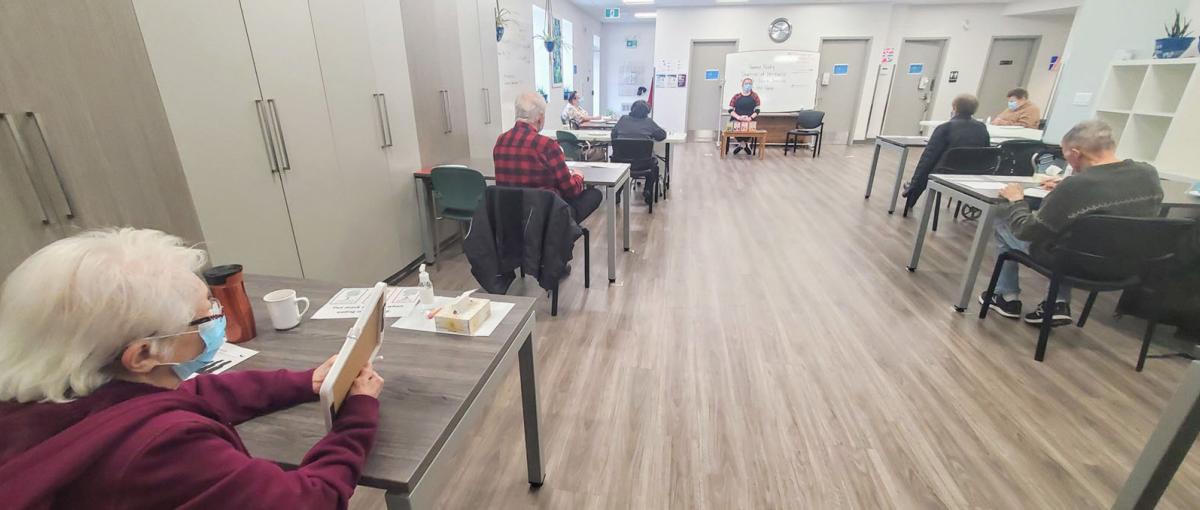Supporting our seniors' mental health
Care providers adapt services during COVID-19 and prepare for what’s ahead

April 19, 2021
By Brenton Driedger, Social Media and Storytelling Advisor, Covenant Health
When Covenant Health’s community geriatric psychiatry program closed its in-person activities as part of COVID-19 safety measures, manager Devona Cross worried about what it would mean to the seniors who attended.
“For some of our folks in the day program, it’s their only outing of the week,” says Devona.
The care team tried to come up with a plan that would offer similar benefits to an in-person experience, even though they were meeting online weekly instead of in person.
“Our day program is a lot of socialization, but it still has the therapeutic aspect of assessment,” says Devona. “Our recreation therapists and therapy assistants will do informal assessments and notice if someone is not doing as well as they were. Then they’ll let us know in the clinic, and we can follow up as necessary.”
Moving day programs online brought mixed results. Virtual activities worked for some seniors, while others struggled. The approach and the results were similar for other services provided by Covenant’s community geriatric psychiatry program, based out of Westmount Mall, including patient assessments and consults.
While some in-person appointments and activities have resumed with increased safety protocols and reduced capacity, like the day programs in Westmount and Ermineskin, some components remain online. That hybrid approach might be here to stay. The team is looking to apply what they’ve learned as they prepare for an increase in mental health needs and elder abuse.
“For some of our patients, telephone appointments just won’t work for them. Face to face is better in all cases, but the telephone follow-up does serve some of our patients well,” says Devona.
Scott Aylwin, senior director of mental health for Covenant Health, agrees that switching to Skype or Zoom for mental health support has had mixed success.
“At first, it seemed like it was heavily weighted as positive because we were still able to see people. We were still able to maintain contact with patients and therapists, still stay connected. But as time has worn on, what we’ve discovered is that it’s really not good for some patients,” says Scott.
“Physical contact and physical connection are what we’re wired to do. And that’s how most of us thrive.”
On the other hand, the pandemic has given seniors more confidence in embracing new technology to connect with both clinicians and loved ones.
“If COVID has had any positive outcome for our seniors, it has been that they found out they could do more than they thought they could,” says Devona. “Some would never have picked up an iPad or a computer and connected to Zoom, so it’s allowed a sense of freedom for them. For some of our folks who have people overseas, they’re now connecting via Zoom with relatives that they haven’t seen for years.”
- Read more: Group therapy goes online
Healthcare providers are working on ways to implement what they’ve learned. Scott Baerg, senior operating officer of addiction, mental health and continuing care, sees benefits to offering a virtual option for those patients who find it effective.
“It allowed us to stay in contact with people from our outpatient and community programs, to be able to maintain that connection where those programs were for the most part closed to in-person visits. It helped us maintain the well-being of those people in community.”
They also recognize the need for in-person interaction. For some people, the routine of getting dressed and preparing to attend an in-person appointment can help build healthy habits, says Scott Aylwin.
“All of that is helpful to somebody who might fall back to being isolated. The steps required to put one foot in front of the other and get to your appointment is itself a step toward independence and health.”
The team is preparing to face an anticipated increase in mental health challenges and a potential surge of elder abuse cases, which includes financial, physical and mental health impacts.
“I suspect we’ll get busier,” says Devona. “The referrals slowed down considerably during the height of the pandemic. We are seeing an increase in the past month.”
Covenant Health is part of the Seniors Protection Partnership, a collaboration with the Edmonton Police Service, the City of Edmonton, Catholic Social Services and SAGE working to prevent and respond to elder abuse. Devona and Scott say the number of reported cases have decreased in the last year, but they believe that’s not because the problems have gone away. They suspect elder abuse has been underreported due to fewer in-person visits and people staying at home during the pandemic.
“Like a lot of social issues, one of the challenges is being able to bring it to light,” says Scott. “The vast preponderance of elder abuse cases, sadly, are people being exploited by family members.”
Thanks to a grant from Alberta Health, Covenant is hiring an additional full-time social worker and part-time nurse practitioner in anticipation of the increased need. The nurse practitioner will be able to provide a medical consult for patients, who often don’t have a family doctor. And the social worker can help assess a variety of potential needs — housing and aids to daily living — and make sure seniors are receiving their government retirement benefits.
“Many referrals to SPP have a financial abuse component to them,” says Devona. “The SPP team looks at all areas of abuse.”
While vaccinations bring hope, there is a realization that the healing process will take time, says Scott Baerg.
“The pandemic has had a significant impact on the mental health of many people, especially our seniors," says Scott. “And having that team approach really works well to provide helpful supports.”